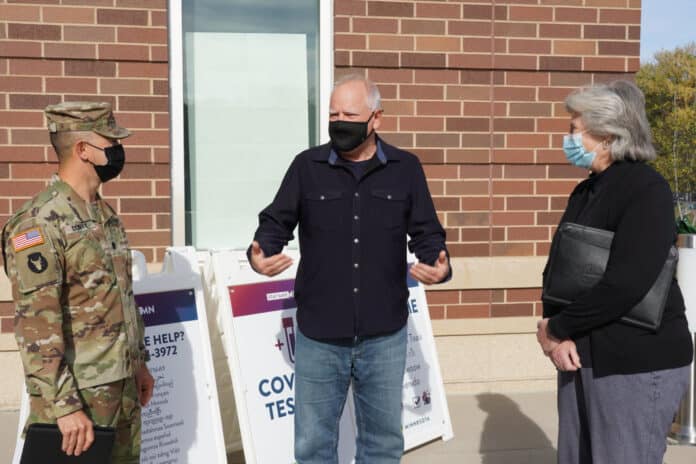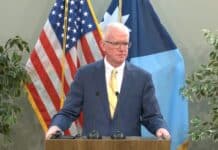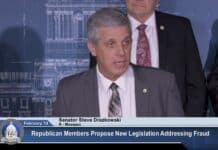
The Minnesota Court of Appeals ruled in favor of Gov. Tim Walz on Monday in a case where a group of citizens had challenged the constitutionality of the governor’s indoor mask mandate that lasted 10 months during 2020 and 2021.
In its decision on Monday, the three-judge panel affirmed a lower court ruling from March 2021 that dismissed the case on the merits. The opinion, written by Judge Michelle Larkin, also noted that Walz was within the authority delegated to him by the legislature to declare a peacetime emergency during the COVID-19 pandemic. That order ran from March 2020 to July 2021.
“ … (B)ecause the Governor designated the COVID-19 pandemic as the basis for the emergency, the question was whether ‘that pandemic’ endangered life and property,” Judge Larkin wrote in the decision released Monday. “And because it was undisputed that the COVID-19 pandemic endangered life and that it caused ‘major economic impacts throughout Minnesota and put Minnesotans’ housing, livelihood, and jobs at risk,’ we concluded that the COVID-19 pandemic endangered property.”
The appellate court ruling came after the Minnesota Supreme Court in February of this year granted an appeal by the petitioners in Snell vs. Tim Walz, Governor of Minnesota that sent the case back to the Court of Appeals to decide whether the state’s Minnesota Emergency Management Act gives the governor authority to declare a peacetime emergency for public health reasons.
In that February ruling Chief Justice Lori Gildea wrote that “the legal question of whether the Emergency Management Act authorizes a peacetime emergency for a public health emergency — such as the COVID-19 pandemic — is functionally justiciable and an important issue of statewide significance that should be decided immediately.”
Attorneys representing Gov. Walz had argued throughout the litigation the court should decline to exercise jurisdiction over the claims because the issue “involves a question about the powers of the legislative and executive branches.”
But in the February state Supreme Court remand, Chief Justice Gildea wrote that the case “is a dispute between the government on the one hand and Minnesota citizens on the other and presents an issue of ‘straightforward’ statutory interpretation.”
The petitioners in the case challenged the mask mandate on several grounds, including that it conflicted with a state statute which criminalizes concealing one’s identity.
They also argued:
- that if the mandate superseded the criminal statute, it violated the state constitution’s separation-of-powers requirement;
- that the Minnesota Emergency Management Act statute is an unauthorized delegation of legislative power; and
- that the mask mandate violates the First Amendment and is unconstitutionally vague.
The Court of Appeals disagreed, citing its own previous ruling earlier this year in Hanson v. State, where Albert Lea restaurant owner Lisa Hanson had sued the state using a similar argument after she had been convicted of operating a bar and restaurant during the COVID-19 pandemic in violation of the governor’s executive orders at the time.
“In [the previous case], we considered the context in which the phrase ‘act of nature’ is used and concluded that its meaning is unambiguous,” Judge Larkin wrote. “For example, we noted that our plain-language approach was confirmed by other sections in the Act that ‘contemplate that a communicable disease may be the basis for a peacetime emergency’ … And even though we concluded that ‘act of nature’ is unambiguous, we noted that the [1996 law’s] legislative history was consistent with our conclusion that the Act authorized a peacetime emergency based on the COVID-19 pandemic.”
Hank Long
Hank Long is a journalism and communications professional whose writing career includes coverage of the Minnesota legislature, city and county governments and the commercial real estate industry. Hank received his undergraduate degree at the University of Minnesota, where he studied journalism, and his law degree at the University of St. Thomas. The Minnesota native lives in the Twin Cities with his wife and four children. His dream is to be around when the Vikings win the Super Bowl.











